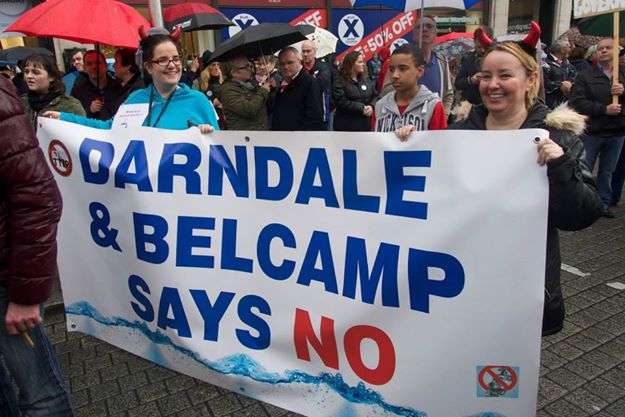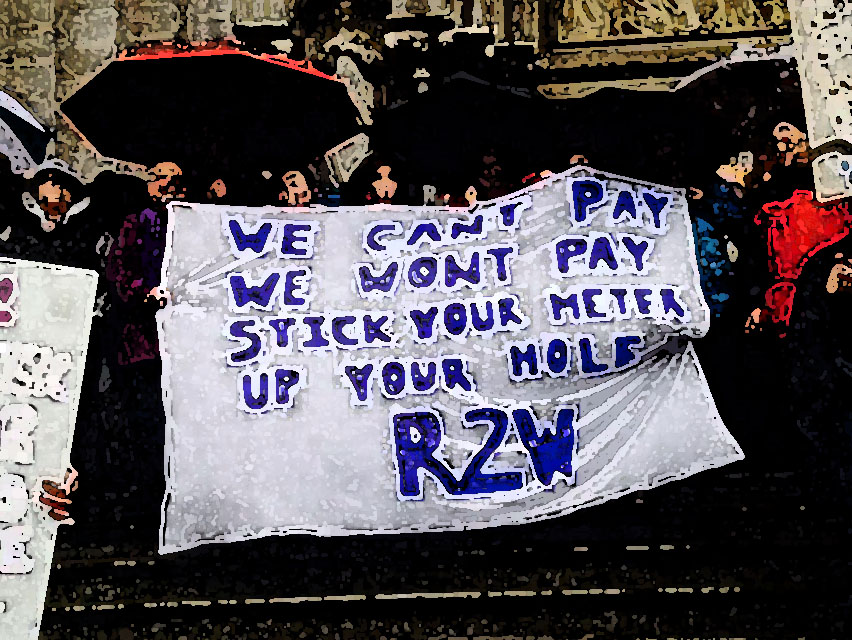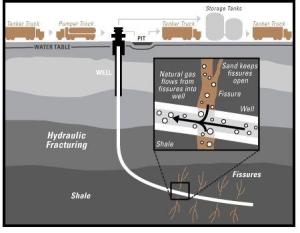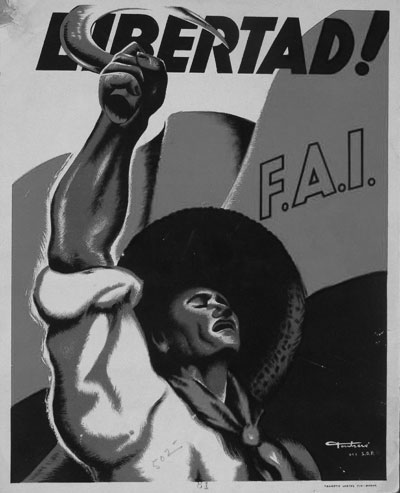Over 30 years of anarchist writing from Ireland listed under hundreds of topics
Newspaper
Five Things You Can do to Set up Your Own Anti-Water Charges Campaign Group
 1) Online Presence
1) Online Presence
A first step is to set up a local Facebook page. This can be used as a focal point for information about the group, and a way of raising awareness that the group exists. A group Twitter account is optional but not as important. Also set up a group email account.
2) Plan a Public Meeting
This could be a meeting for your street or for your estate, or a larger meeting for the wider area.
Water Charges: They didn't ask our consent - The law must be broken!
 The recent announcement that people who have returned their registration packs to Irish Water blank, or emblazoned with the words “No consent, no contract”, are now registered with the service provider, should be enough to expose the counter-legal mumbo jumbo being spread by Direct Democracy Ireland (DDI), and other groups influenced by the “Freeman of the land” ideology.
The recent announcement that people who have returned their registration packs to Irish Water blank, or emblazoned with the words “No consent, no contract”, are now registered with the service provider, should be enough to expose the counter-legal mumbo jumbo being spread by Direct Democracy Ireland (DDI), and other groups influenced by the “Freeman of the land” ideology.
DDI claim that the registration pack is a contract and that by returning it with a statement of non-consent, you have made your intention not to make a contract with Irish Water clear and therefore you do not have to pay the water charge. Not only that, but they claim that if you are brought to court for non-payment, all you need to do is show a photo of the pack to back up your case.
Defeating the water charges - Don’t be fooled by the concessions - 4 page PDF paper

In the face of massive opposition to the water charges, the government have made several clumsy attempts to placate us, while their partners in the media seek to frighten us off the streets. The latest attempt, delivered by Alan Kelly, Minister for the Environment, Community & Local Government in the Dáil on the 19th of November, is the plan to charge us €160 per year for our water and to give ‘eligible households’ a water conservation grant of €100.
Why Fracking of the Loch Allen Basin is being opposed
 One of the final acts of the last Fianna Fail government was to award licences to a number of companies to explore for commercial gas in the Northwest Carboniferous Basin (more commonly known as the Lough Allen basin). The Lough Allen Basin is a huge area that covers parts of counties Cavan, Donegal, Fermanagh, Leitrim, Mayo, Monaghan, Roscommon, Sligo and Tyrone. It is an area of 8000 square kilometres in total.
One of the final acts of the last Fianna Fail government was to award licences to a number of companies to explore for commercial gas in the Northwest Carboniferous Basin (more commonly known as the Lough Allen basin). The Lough Allen Basin is a huge area that covers parts of counties Cavan, Donegal, Fermanagh, Leitrim, Mayo, Monaghan, Roscommon, Sligo and Tyrone. It is an area of 8000 square kilometres in total.
How the DEIS cuts were reversed in primary schools
 Following his announcement that many of his proposed cuts to teacher numbers in schools serving areas of social disadvantage (“DEIS schools”) are to be reversed, Minister for Education and Skills, Ruairi Quinn, has admitted that protests work and that he made the decision because of the huge protests faced by himself and his colleagues on the government backbenches. “[I]n relation to the area where all the pressure was coming from and all the protests was [sic] coming from …. I reflected on the impact on those schools…. and I reversed that decision,” he said.
Following his announcement that many of his proposed cuts to teacher numbers in schools serving areas of social disadvantage (“DEIS schools”) are to be reversed, Minister for Education and Skills, Ruairi Quinn, has admitted that protests work and that he made the decision because of the huge protests faced by himself and his colleagues on the government backbenches. “[I]n relation to the area where all the pressure was coming from and all the protests was [sic] coming from …. I reflected on the impact on those schools…. and I reversed that decision,” he said.
What is the Fiscal Compact: Smoke & Mirrors
 As the flames from the latest round of rioting in Greece die down, the incapacity of the mainstream media to tell the story of the current Eurozone crisis leaves us as much in the dark as before the Molotov’s lit up the nightly news.
As the flames from the latest round of rioting in Greece die down, the incapacity of the mainstream media to tell the story of the current Eurozone crisis leaves us as much in the dark as before the Molotov’s lit up the nightly news.
Neoliberalism & the restructuring of Education
 In mid-August, Labour Minister for Education Ruairi Quinn announced both further increases to the “registration fee”, which currently stands at €2000, and the return of tuition fees, which will be payable at point-of-entry, for third level education. Coupled with the massive cuts already to the grants system, this will make it prohibitively expensive for many students to enter and complete third level education, and impose a substantial financial burden on those that do. The implications of this will be further falls in the standard of living of ordinary families and increased indebtedness for young people as they begin their adult lives. For many prospective mature students, their hopes of getting back to education will be ruined.
In mid-August, Labour Minister for Education Ruairi Quinn announced both further increases to the “registration fee”, which currently stands at €2000, and the return of tuition fees, which will be payable at point-of-entry, for third level education. Coupled with the massive cuts already to the grants system, this will make it prohibitively expensive for many students to enter and complete third level education, and impose a substantial financial burden on those that do. The implications of this will be further falls in the standard of living of ordinary families and increased indebtedness for young people as they begin their adult lives. For many prospective mature students, their hopes of getting back to education will be ruined.
The Spanish Revolution: A quick introduction
 The 19th of July marked the 75th anniversary of the beginning of the Spanish Revolution. For a brief time, capitalism and the State were replaced by solidarity, mutual aid and respect for others. Workers and peasants, who were deeply influenced by anarchist ideas, ran society collectively and gained control over their lives, industry and land. A central part of the revolution was the struggle against a fascist attempt to take over Spain. We remember both the magnificent triumphs and tragedies of the Spanish revolution and attempt to learn from our comrades’ mistakes.
The 19th of July marked the 75th anniversary of the beginning of the Spanish Revolution. For a brief time, capitalism and the State were replaced by solidarity, mutual aid and respect for others. Workers and peasants, who were deeply influenced by anarchist ideas, ran society collectively and gained control over their lives, industry and land. A central part of the revolution was the struggle against a fascist attempt to take over Spain. We remember both the magnificent triumphs and tragedies of the Spanish revolution and attempt to learn from our comrades’ mistakes.
Anarchism, Internationalism & the Euro Zone Crisis
The euro zone crisis, and the mainstream opinion formers’ response to it, raises the question of nationalistic understandings of the way the world works, and how these understandings frame our perception of where our interests lie.
Capitalist crisis & default - Can Ireland Go it Alone?
 As the scale of the debts loaded onto the Irish people became clear, the calls for defaulting became louder. The moral argument for default is certainly strong: why should Irish workers pay for the poor decisions of Irish and European capitalists? But justified though it may be, would defaulting cause more pain than gain?
As the scale of the debts loaded onto the Irish people became clear, the calls for defaulting became louder. The moral argument for default is certainly strong: why should Irish workers pay for the poor decisions of Irish and European capitalists? But justified though it may be, would defaulting cause more pain than gain?

